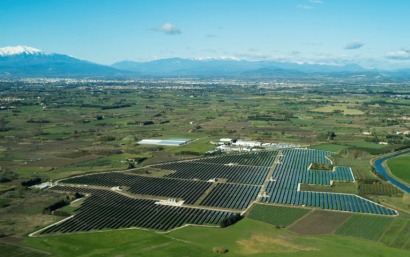
The announcement came as Singapore observed its annual "International energy week."
Asia is considered one of the key markets with the highest potential for renewable energies and is quickly moving towards energy transition.
At present, 65 juwi employees are working in Asia-Pacific with Singapore as the hub for all of the company's activities.
“Singapore is well positioned as the leading project development and financing hub for the Asia-Pacific region which is regarded as the next growth frontier in renewable energy," said Goh Chee Kiong, Director of Cleantech at the Singapore Economic Development Board. "Companies can also leverage Singapore’s strengths in market access, technology and ability to attract international talent. We are confident that juwi’s new regional headquarters in Singapore will help increase the vibrancy of our clean technology industry.”
Amiram Roth-Deblon, juwi Regional Director Asia-Pacific, agreed.
“Singapore holds a unique position as the vibrant economic centre of Asia-Pacific. We are very well supported here and could thus successfully start our business,” Roth-Deblon said, adding, "We are very happy to have found a strategic partner in Japan with great cooperation leading to a successful market entry in Japan.
"We are convinced that one hundred per cent electricity supply with renewable energy is not only possible, but worthwhile. It is the only secure, affordable and sustainable alternative to nuclear power stations and coal power stations,” he added.
In Taiwan, juwi is currently installing photovoltaic systems on eight rooftops. The projects are being constructed in the Province of Jyn Lin. Since the beginning of October, juwi employees and the company's local Taiwanese partner started renovating the roof for the installation of the photovoltaic system. By the beginning of December the solar plant is expected to be connected to the grid.
So far juwi has realized the greatest volume of Asian projects in India. Here the company started its activities with solar energy in October 2010. Up until now five solar free-field plants have been connected to the grid. In total these projects have a capacity of 22 MW.
The projects are located in the Northern part of India. Moreover, three more solar free-field plants with a total capacity of approximately 50 megawatt are currently being built by juwi in India. These projects will be connected to the grid in January 2013 at the latest. They are situated in in the federal state of Rajasthan in Northern India.
“India has a rising energy demand. Renewable energies are a good means to answer this demand without polluting the environment,” Roth-Deblon said.
The company is going to expand its activities as project developer, financier and EPC contractor also to other Asia-Pacific markets.
“We think that the markets in Asia-Pacific have a large untapped potential for renewable energies. Asia has a backlog of demand for renewable energies and its energy demand is steadily increasing," said juwi CFO Martin Winter. "We therefore expect high growth rates in the field of renewable energies. With 16 years of experience, juwi can contribute significantly to the development of the green energy market.” In the medium-term juwi not only plans to be active in the field of solar, but also in the field of wind and other forms of renewable energy such as bioenergy."
Last month, juwi and its strategic Japanese partner started the construction of asolar free-field plant in Japan. The project is located in the south of Japan which has a capacity of one megawatt and will produce environmentally friendly electricity for approximately 300 households. The plant will be connected to the grid by mid-December.
For additional information:

